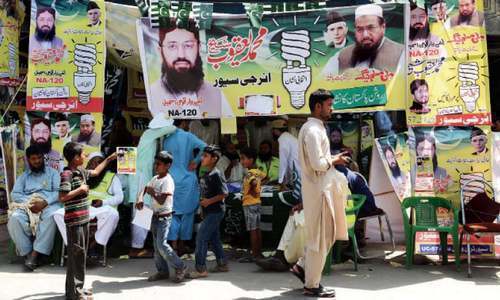KARACHI: Condemning attempts to “influence” voters to stay away from the democratic process, civil society representatives, trade unionists and politicians on Sunday resolved to continue their struggle for protection of democracy and asked voters to exercise their right of franchise against candidates belonging to extremist groups.
They spoke at a seminar on ‘Current election situation and curbs on freedom of expression’ organised by civil society organisations and trade unions at the Pakistan Medical Association (PMA) House.
The speakers expressed serious concerns over “interference in the election process aimed at manipulating results and getting certain political parties in power”.
Imtiaz Alam of the South Asia Free Media Association (Safma) claimed that barring one election held in 1970 all other elections in the past were ‘manipulated’.
Speakers have warned of conspiracies against the 18th Amendment
He said that the media was “under tight control of the establishment, which gives instructions on a daily basis. The situation after July 25 elections would be more dangerous,” he maintained.
Mr Alam said another Islami Jamhoori Ittehad (IJI) had been created and jihadi groups were being supported to return to parliament.
He asked the people to oppose all those parties and candidates who used religion for politics and those who were not talking about people’s right to rule and had affiliation with the “king’s party”.
Dr Riaz Shaikh of the Shaheed Zulfikar Ali Bhutto Institute of Science and Technology (Szabist) called for using social media for mobilising public to vote for pro-democracy candidates. “On the poll day every violation should be reported immediately on social media.”
He called for unity among democratic people even after elections.
He said he feared that conspiracies were being hatched against the 18th Amendment to the Constitution after the elections as “certain forces want to promote extremism and rewriting the curriculum”.
Writer and columnist Zahida Hina said Punjab’s situation had tangibly changed and people had realised their right to vote was under threat.
“Our actual test will start after July25,” she said. “We have to be prepared for a long war for people’s rights”.
Yousuf Mastikhan of the Awami Workers Party said people’s right to vote was being snatched.
He said: “They openly abolished the Balochistan government and interfered in the Senate elections. Even today, bodies of political workers are being recovered in Balochistan, but the media is forced not to report”.
Asad Iqbal Butt, vice chairman of the Human Rights Commission of Pakistan (HRCP), said a change was possible if people who had fought for democracy in Pakistan gathered under one umbrella.
“Pakistan has been facing martial law because they could not stop people from exercising their right to vote,” he added.
He said the HRCP would, as in the past, observe the coming elections.
“We are receiving complaints that law enforcement agencies are asking voters to vote for a particular party. If people refuse, they ask them not to exercise their right of vote on the poll day,” he said.
Nasir Mansoor of the National Trade Union Federation (NTUF) said that the establishment’s intervention remained there in all elections, but “this time common people are openly speaking about it”.
He said he feared hard times were ahead after the elections.
Habibuddin Junaidi, Mahnaz Rahman, Liaquat Sahi and Karamat Ali also spoke.
Published in Dawn, July 23rd, 2018













































